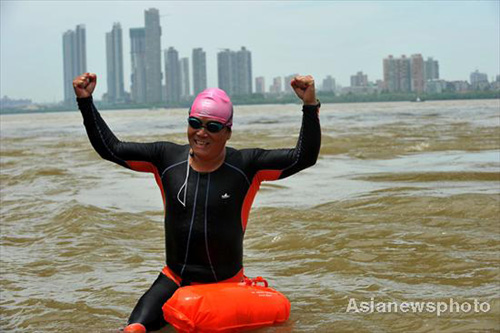|

A fan of swimming, Bao Zhengbin greets supporters during his drill in the Yangtze River at Wuhan city, Central China’s Hubei province on July 1, 2010. Bao, one of many swimming fans in Wuhan, will begin his big challenge on July 7 of swimming 1,200 kilometers along the Yangtze River to Shanghai. The 56-year old said he has dreamed of swimming from Wuhan to Shanghai for 44 years. [Photo/Asianewsphoto]
|
SHANGHAI - A 56-year-old man completed a marathon 32-day, 1,200-km Yangtze River swim from Wuhan to Shanghai on Sunday to draw attention to heavy pollution in the waterway.
Bao Zhengbin, a 12-time record breaker of Popular Sports in China, a national competition designed for amateur athletes, said he is aiming to use Expo 2010 Shanghai to promote environmental protection.
He said he has wanted to swim from Wuhan to Shanghai since childhood, after the scenery along the Yangtze River enchanted him during a trip.
The Expo was the ideal occasion for him to fulfill this dream, he said.
But swimming 40 km a day battling rapids, waves and heavy rain was not easy. Bao said he suffered from constant leg cramps, fatigue and cold after spending hours in the water every day, but was in good health when he arrived at Shanghai's Chongming Island on Sunday. He also had to watch out for ships on the river.
"I'm feeling quite well," he said after finishing his swim.
But of all the risks he faced, nothing compared to his fear of the water quality in the Yangtze River, which has been "deteriorating rapidly due to heavy pollution".
"So many ships and factories along the river are dumping waste water into it," he said.
He said the river was so polluted and pungent he could not stay in the water for too long. "It was also terrible to think that sometimes I had to drink the water to quench my thirst," he said.
He noticed countless chemical plants and steel and iron companies that not only "ruin the beautiful scenery of the Yangtze River, but also pose threats to the water quality", he said.
"It is urgent that both the government and public should realize how our current mode of economic development is unsustainable," he said.
"Isn't it enough that we've seen so much damage to the environment and its devastating impact on our lives?"
As part of his mission to raise public awareness on environmental protection, Bao used his own money to print 200 copies of an album of photos that he took and collected from the media about environmental degradation. He distributed the books in the 32 cities he stopped along his journey.
This was not Bao's first effort to call attention to water pollution in the Yangtze River. Three years ago he exposed secret drainage outlets of riverside companies in Wuhan, which he discovered while swimming in the river.
His action won the attention of local authorities, which later punished or closed many of the exposed enterprises.
"I'm not pursuing fame," he said. "My only wish is to put out the message that we should take better care of our mother river and the environment. We cannot afford to lose any more."

